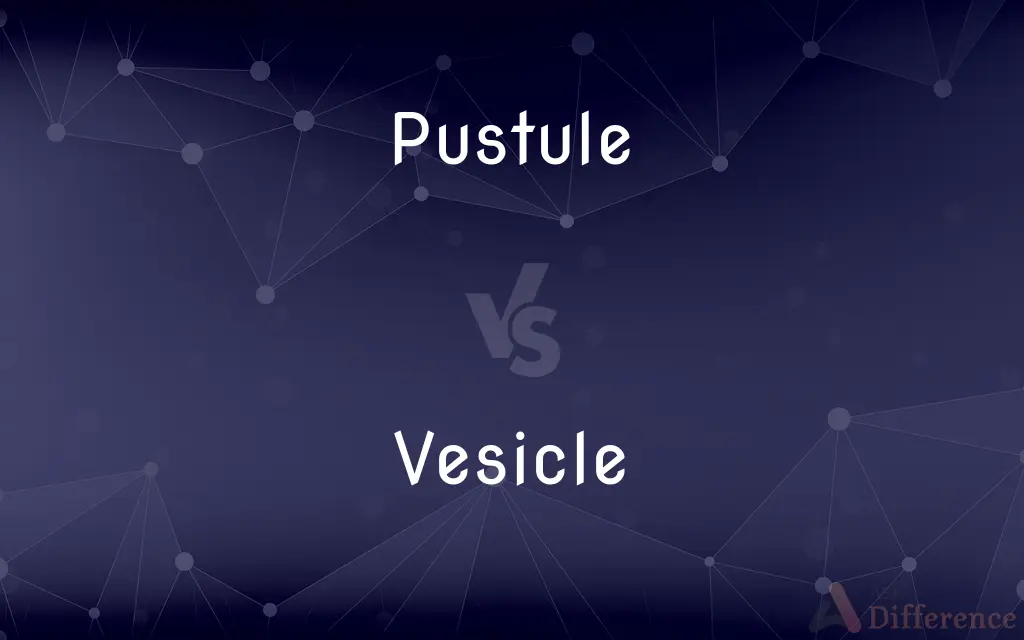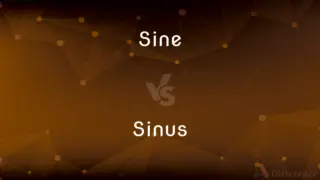Pustule vs. Vesicle — What's the Difference?
Edited by Tayyaba Rehman — By Urooj Arif — Updated on April 8, 2024
A pustule is a small, inflamed, pus-filled lesion on the skin, whereas a vesicle is a small, fluid-filled blister.

Difference Between Pustule and Vesicle
Table of Contents
ADVERTISEMENT
Key Differences
Pustules are typically associated with bacterial infections and can be a sign of acne or impetigo, characterized by their white or yellowish pus-filled center surrounded by red skin. Whereas vesicles, often clear and fluid-filled, are commonly caused by viral infections, contact dermatitis, or allergic reactions, appearing as small blisters on the skin without the presence of pus.
Pustules are generally larger than vesicles, with a diameter of more than 5mm, indicating a more significant inflammatory response. On the other hand, vesicles are usually smaller, with a diameter of less than 5mm, and are indicative of early-stage skin reactions to various stimuli.
The formation of pustules involves the accumulation of leukocytes (white blood cells), leading to the production of pus. This is a defense mechanism against infection. In contrast, vesicles form due to the accumulation of fluid either from serum, the clear part of blood, or from inflammatory exudate, reflecting a different type of body reaction.
Pustules are often painful or tender to the touch, reflecting their association with deeper skin inflammation and infection. Meanwhile, vesicles can be itchy or cause a burning sensation, especially when they are a result of contact dermatitis or viral infections like herpes simplex.
Treatment for pustules typically involves antibiotics or antiseptic medications to fight the underlying bacterial infection, while the treatment for vesicles may include antiviral drugs or corticosteroids to reduce inflammation and alleviate symptoms, highlighting the difference in their causes and therapeutic approaches.
ADVERTISEMENT
Comparison Chart
Definition
Inflamed, pus-filled lesion on the skin.
Small, fluid-filled blister on the skin.
Size
Generally larger (>5mm in diameter).
Usually smaller (<5mm in diameter).
Cause
Bacterial infections, acne, impetigo.
Viral infections, allergic reactions.
Content
Pus (leukocytes and bacteria).
Clear fluid (serum or inflammatory exudate).
Symptoms
Painful or tender to the touch.
Itchy, burning sensation.
Treatment
Antibiotics, antiseptics.
Antiviral drugs, corticosteroids.
Compare with Definitions
Pustule
Often associated with acne.
He applied topical cream to treat the pustules dotting his cheeks.
Vesicle
Indicates early-stage skin reactions.
The vesicles were the first sign of her allergic reaction.
Pustule
Can appear anywhere on the body.
The nurse noted pustules developing on the patient's back.
Vesicle
A small blister filled with clear fluid.
Vesicles appeared on his skin after touching poison ivy.
Pustule
A small inflamed elevation of skin containing pus.
After scratching the area, a pustule formed at the site of irritation.
Vesicle
Treatment may include antiviral drugs.
To treat the vesicles, the doctor recommended an antiviral medication.
Pustule
Indicator of infection or inflammation.
Pustules on her face suggested a severe acne breakout.
Vesicle
Less than 5mm in diameter.
A cluster of small vesicles formed on her forearm.
Pustule
Treated with antibiotics or antiseptic.
The dermatologist prescribed an antibiotic for the pustules.
Vesicle
Associated with viral infections and allergic reactions.
Chickenpox caused numerous itchy vesicles.
Pustule
A small inflamed elevation of the skin that is filled with pus; a pimple.
Vesicle
(Cytology) A membrane-bound structure within a cell in which materials such as enzymes are transported or stored.
Pustule
A small swelling similar to a blister or pimple.
Vesicle
(Anatomy) A sac or cyst, especially one containing fluid.
Pustule
Something likened to an inflamed, pus-filled lesion
"a cool glimpse of green between hot pustules of sooty sprawl" (Nicholas Proffitt).
Vesicle
(Medicine) A blister of the skin.
Pustule
(dermatology) A small accumulation of pus in the epidermis or dermis.
Vesicle
(Geology) A cavity formed in volcanic rock by entrapment of a gas bubble during solidification.
Pustule
A pimple filled with pus.
Vesicle
(cytology) A membrane-bound compartment found in a cell.
Pustule
Anything like a pustule, on plants or animals; a small blister.
Vesicle
A small bladder-like cell or cavity, as:
Pustule
A vesicle or an elevation of the cuticle with an inflamed base, containing pus.
Vesicle
(botany) A small sac filled with juice, one of many constituting the pulp of a fruit such as an orange, lemon, or grapefruit.
Pustule
A small inflamed elevation of skin containing pus; a blister filled with pus
Vesicle
A small sac or cyst or vacuole, especially one containing fluid. A blister formed in or beneath the skin, containing serum. A bleb.
Vesicle
(anatomy) A pocket of embryonic tissue that is the beginning of an organ.
Vesicle
(geology) A small cavity formed in volcanic rock by entrapment of a gas bubble during solidification.
Vesicle
A bladderlike vessel; a membranous cavity; a cyst; a cell.
Vesicle
A small bladderlike body in the substance of a vegetable, or upon the surface of a leaf.
Vesicle
A small, and more or less circular, elevation of the cuticle, containing a clear watery fluid.
Vesicle
A cavity or sac, especially one filled with fluid; as, the umbilical vesicle.
Vesicle
A small convex hollow prominence on the surface of a shell or a coral.
Vesicle
A small cavity, nearly spherical in form, and usually of the size of a pea or smaller, such as are common in some volcanic rocks. They are produced by the liberation of watery vapor in the molten mass.
Vesicle
A small anatomically normal sac or bladderlike structure (especially one containing fluid)
Common Curiosities
What causes pustules to form?
Pustules form due to bacterial infections, acne, or skin conditions like impetigo, leading to pus accumulation.
Can pustules appear anywhere on the body?
Yes, pustules can develop on any part of the body, including the face, back, and limbs.
What is a vesicle?
A vesicle is a small, fluid-filled blister on the skin, usually clear and caused by viral infections or allergic reactions.
What's the difference between a pustule and a vesicle?
The main difference is in their content; pustules are filled with pus, while vesicles contain clear fluid.
Can stress cause pustules or vesicles?
Stress can exacerbate conditions like acne that lead to pustules and can trigger outbreaks of viral infections that cause vesicles.
Are pustules contagious?
Pustules themselves are not contagious, but the infections causing them, like impetigo, can be.
What is a pustule?
A pustule is a small, inflamed, pus-filled lesion on the skin, often caused by bacterial infections.
Is a pustule the same as a pimple?
A pustule is a type of pimple that contains pus.
What treatments are effective for pustules?
Treatments include antibiotics or antiseptic medications to target the underlying infection.
Are vesicles painful?
Vesicles can be itchy or cause a burning sensation, but are not typically painful.
How are vesicles treated?
Treatment may include antiviral drugs or corticosteroids to alleviate symptoms and address the cause.
Can both pustules and vesicles indicate acne?
Pustules are commonly associated with acne, whereas vesicles are not typically linked to acne.
How can I prevent pustules?
Preventing pustules involves good skincare, avoiding known irritants, and treating underlying conditions.
Can vesicles spread on the body?
Vesicles can spread, especially if caused by contagious viral infections like herpes simplex or chickenpox.
What triggers vesicle formation?
Triggers include viral infections, direct contact with irritants, or allergic reactions.
Share Your Discovery

Previous Comparison
Collateral vs. Security
Next Comparison
Sine vs. SinusAuthor Spotlight
Written by
Urooj ArifUrooj is a skilled content writer at Ask Difference, known for her exceptional ability to simplify complex topics into engaging and informative content. With a passion for research and a flair for clear, concise writing, she consistently delivers articles that resonate with our diverse audience.
Edited by
Tayyaba RehmanTayyaba Rehman is a distinguished writer, currently serving as a primary contributor to askdifference.com. As a researcher in semantics and etymology, Tayyaba's passion for the complexity of languages and their distinctions has found a perfect home on the platform. Tayyaba delves into the intricacies of language, distinguishing between commonly confused words and phrases, thereby providing clarity for readers worldwide.














































